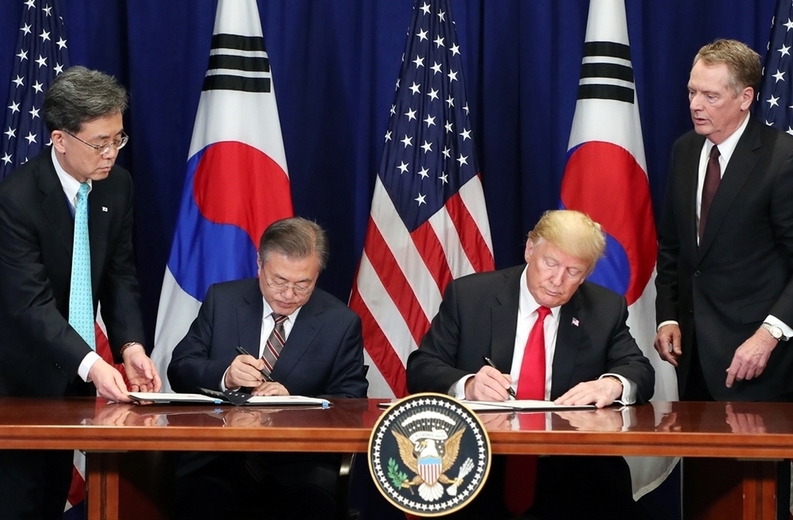 |
|
South Korean President Moon Jae-in signs the revised Korea-US Free Trade Agreement (KORUS) in New York on Sept. 24, 2018. (Blue House photo pool)
|
Documents may prove US pressure in influencing Seoul’s intellectual property policies
The South Korean government must disclose the correspondence related to intellectual property rights (IRP) that it conducted with US lawmakers and businesses after the Korea-US Free Trade Agreement (KORUS FTA) took effect, a South Korean court has ruled. This could be an opportunity to confirm claims that US pressure played a major role in Seoul’s IRP policies and laws. On Aug. 11, Hon. Hong Sun-uk, head of the 12th administrative division at the Seoul Administrative Court, partially sided with a patent attorney named Nam Hui-seop, who had asked the court to force the Ministry of Trade, Industry, and Energy (MOTIE) to comply with a freedom of information request. The court ruled that MOTIE must disclose messages received from American lawmakers and companies in the area of IRP, as well as MOTIE’s responses, after the FTA went into effect. The Supreme Court ruled in Oct. 2018 that IRP documents exchanged during the FTA negotiations must be made public, but this is the first court ruling ordering the disclosure of subsequent correspondence. If the documents are released according to the court ruling, it could pave the way for confirming the veracity of accusations that South Korean lawmakers have been pressured by the US or have accommodated American interests while drafting IRP legislation. One of the major examples was the amendment of the Pharmaceutical Affairs Act in 2015. During the debate about whether to link permits to patents in the area of biomedicine, the US wanted the adoption of protocols based on the KORUS FTA that would temporarily ban the sale of biosimilars until pending patent disputes had been resolved. Messages sent from the US to the National Assembly on this topic were revealed in the National Assembly subcommittee responsible for deliberating bills. Despite major concerns that this would harm South Korean small and medium-sized pharmaceutical firms that were busily producing biosimilars, the law was ultimately amended in a manner beneficial to US big pharma. When Nam asked MOTIE to release IRP documents that the South Korean government had received from the US, MOTIE only released a list of 13 documents, and said that they “couldn’t be made public in light of diplomatic relations.” During the lawsuit, the ministry tried to persuade the court that the documents should be kept secret. “Because a substantial portion of the documents only exist in paper format, and not as electronic files, a massive amount of time would be necessary to make them available,” MOTIE said, also noting a “major risk” of the information, once released, “being exploited by other countries to inform their own negotiations.” But the court sided with Nam. “All the records related to the FTA are computerized, and MOTIE didn’t use all the necessary search terms,” the court said in its ruling. “The US Congress and business sector appear to have continued to convey their opinions about the IPR area to the [South Korean] government. There’s no reason to regard the disclosure of these documents as having the potential to damage major national interests,” the court also said. “Information about trade should be made available speedily and clearly, to ensure that our industry can take the necessary preparations. The US and European countries release nearly all the information about trade negotiations on their websites as soon as the agreement is concluded,” said Ahn Duk-geun, a professor of international trade at the Graduate School of International Studies at Seoul National University. MOTIE, which received the court’s ruling on Aug. 7, is reportedly considering whether to appeal. By Jang Ye-ji, staff reporter Please direct comments or questions to [english@hani.co.kr]






